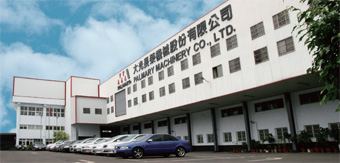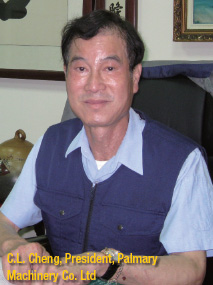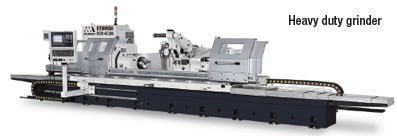
Taiwan-based grinding machine manufacturer Palmary Machinery Co. Ltd President C.L. Cheng shared with International Metalworking News Asia its approach in penetrating the Asian market.
IMNA: Is the company focusing a particular market segment for your grinding machines? Mr. Cheng: Grinding is the final procedure in all processing industries. However, grinding machine still occupy a small market since it is not necessary for all industries. But the need for grinding machines in the industrial precision sector is higher, especially in the hi-tech and motor vehicle industries. The automotive industry is progressing and the quality requests for these machines are meticulous. Aside from motor vehicle industry, Palmary machines also dabble in the semiconductor sector. We constantly improve our products to satisfy the needs of each market.
 IMNA: Clue us on Palmary Machinery's environmental concern
IMNA: Clue us on Palmary Machinery's environmental concern Mr. Cheng: Although grinding machine processing does not contribute too much pollution to the environment, Palmary is still seeking for the latest and most effective equipment filtration and defence in response to the ongoing environmental consciousness. The company purchases specialised filtrating systems from Europe, America and Japan to maintain cleanliness and safety, and to lower the environmental impact.
IMNA: Who are your primary customers in Asia for grinding machines? Mr. Cheng: In Asia, the main client of Palmary is still mainland China and Taiwan. China's cheap and simple grinding machine processing equipment satisfy the demands from the processed products industry, therefore the mainland area became our main customers for this equipment in the entire Asian market recently.
IMNA: Is it difficult to do business in Asia? Mr. Cheng: The Asian market is the major region in the 20th century around the world. Competition grows day by day. Palmary is looking on how to further expand its market, technical depth and the product's brand identity (attitude branding). Although, Palmary can provide grinding machines to cover product demands, it is not easy to do business. The manufacturing condition is a little different between the entire Asia. However, Palmary is glad to accept this challenge.
IMNA: Which end user sector brings you the maximum business? Mr. Cheng: The motor vehicle components industry still presents as the main customer of Palmary. In 2009, U.S.' and Europe's economy fell, and many motor vehicle component makers extended its reach in Asia. Even if Europe and U.S. develop envi ronmental protect ion energy t o substitute for the traditional energy, the production technology is still in Asian. So, we estimate that Palmary will get the biggest growth in the Asian market.
 IMNA: Describe the Asian market?
IMNA: Describe the Asian market? Mr. Cheng: For the entire Asian market, Palmary classifies the market into East Asia, South East Asia and West Asian. In East Asia, we don't have problems in communication, coordination and technical backstopping because China is also a Chinese region. But in South Korea, Taiwan equipment purchas e largely reduced because the South Korean government is strengthening the industrial technology there, which is a big help for the local machine manufacturers. Also, the market is difficult to impel. Japan is a totally different story. Its machines cost high, including local wages, expenses, and higher requests for technical accuracy. Chinese manufacturers almost monopolise the South East Asia market. After year 2000, India was recognised to substitute for China in the equipment processing market. Although the demand for Taiwan's equipment is increasing, this market area is still very difficult to move smoothly because buyers haggle over the purchase price, plus manufacturers from v
Hombre Taiwan-based grinding machine manufacturer Palmary Machinery Co. Ltd President C.L. Cheng shared with International Metalworking News Asia its approach in penetrating the Asian market. IMNA: Is the company focusing a particular market segment for your grinding machines? Mr. Cheng: Grinding is the final procedure in all processing industries. However, grinding machine still occupy a small market since it is not necessary for all industries. But the need for grinding machines in the industrial precision sector is higher, especially in the hi-tech and motor vehicle industries. The automotive industry is progressing and the quality requests for these machines are meticulous. Aside from motor vehicle industry, Palmary machines also dabble in the semiconductor sector. We constantly improve our products to satisfy the needs of each market.
Taiwan-based grinding machine manufacturer Palmary Machinery Co. Ltd President C.L. Cheng shared with International Metalworking News Asia its approach in penetrating the Asian market. IMNA: Is the company focusing a particular market segment for your grinding machines? Mr. Cheng: Grinding is the final procedure in all processing industries. However, grinding machine still occupy a small market since it is not necessary for all industries. But the need for grinding machines in the industrial precision sector is higher, especially in the hi-tech and motor vehicle industries. The automotive industry is progressing and the quality requests for these machines are meticulous. Aside from motor vehicle industry, Palmary machines also dabble in the semiconductor sector. We constantly improve our products to satisfy the needs of each market.  IMNA: Clue us on Palmary Machinery's environmental concern Mr. Cheng: Although grinding machine processing does not contribute too much pollution to the environment, Palmary is still seeking for the latest and most effective equipment filtration and defence in response to the ongoing environmental consciousness. The company purchases specialised filtrating systems from Europe, America and Japan to maintain cleanliness and safety, and to lower the environmental impact. IMNA: Who are your primary customers in Asia for grinding machines? Mr. Cheng: In Asia, the main client of Palmary is still mainland China and Taiwan. China's cheap and simple grinding machine processing equipment satisfy the demands from the processed products industry, therefore the mainland area became our main customers for this equipment in the entire Asian market recently. IMNA: Is it difficult to do business in Asia? Mr. Cheng: The Asian market is the major region in the 20th century around the world. Competition grows day by day. Palmary is looking on how to further expand its market, technical depth and the product's brand identity (attitude branding). Although, Palmary can provide grinding machines to cover product demands, it is not easy to do business. The manufacturing condition is a little different between the entire Asia. However, Palmary is glad to accept this challenge. IMNA: Which end user sector brings you the maximum business? Mr. Cheng: The motor vehicle components industry still presents as the main customer of Palmary. In 2009, U.S.' and Europe's economy fell, and many motor vehicle component makers extended its reach in Asia. Even if Europe and U.S. develop envi ronmental protect ion energy t o substitute for the traditional energy, the production technology is still in Asian. So, we estimate that Palmary will get the biggest growth in the Asian market.
IMNA: Clue us on Palmary Machinery's environmental concern Mr. Cheng: Although grinding machine processing does not contribute too much pollution to the environment, Palmary is still seeking for the latest and most effective equipment filtration and defence in response to the ongoing environmental consciousness. The company purchases specialised filtrating systems from Europe, America and Japan to maintain cleanliness and safety, and to lower the environmental impact. IMNA: Who are your primary customers in Asia for grinding machines? Mr. Cheng: In Asia, the main client of Palmary is still mainland China and Taiwan. China's cheap and simple grinding machine processing equipment satisfy the demands from the processed products industry, therefore the mainland area became our main customers for this equipment in the entire Asian market recently. IMNA: Is it difficult to do business in Asia? Mr. Cheng: The Asian market is the major region in the 20th century around the world. Competition grows day by day. Palmary is looking on how to further expand its market, technical depth and the product's brand identity (attitude branding). Although, Palmary can provide grinding machines to cover product demands, it is not easy to do business. The manufacturing condition is a little different between the entire Asia. However, Palmary is glad to accept this challenge. IMNA: Which end user sector brings you the maximum business? Mr. Cheng: The motor vehicle components industry still presents as the main customer of Palmary. In 2009, U.S.' and Europe's economy fell, and many motor vehicle component makers extended its reach in Asia. Even if Europe and U.S. develop envi ronmental protect ion energy t o substitute for the traditional energy, the production technology is still in Asian. So, we estimate that Palmary will get the biggest growth in the Asian market.  IMNA: Describe the Asian market? Mr. Cheng: For the entire Asian market, Palmary classifies the market into East Asia, South East Asia and West Asian. In East Asia, we don't have problems in communication, coordination and technical backstopping because China is also a Chinese region. But in South Korea, Taiwan equipment purchas e largely reduced because the South Korean government is strengthening the industrial technology there, which is a big help for the local machine manufacturers. Also, the market is difficult to impel. Japan is a totally different story. Its machines cost high, including local wages, expenses, and higher requests for technical accuracy. Chinese manufacturers almost monopolise the South East Asia market. After year 2000, India was recognised to substitute for China in the equipment processing market. Although the demand for Taiwan's equipment is increasing, this market area is still very difficult to move smoothly because buyers haggle over the purchase price, plus manufacturers from vHombre
IMNA: Describe the Asian market? Mr. Cheng: For the entire Asian market, Palmary classifies the market into East Asia, South East Asia and West Asian. In East Asia, we don't have problems in communication, coordination and technical backstopping because China is also a Chinese region. But in South Korea, Taiwan equipment purchas e largely reduced because the South Korean government is strengthening the industrial technology there, which is a big help for the local machine manufacturers. Also, the market is difficult to impel. Japan is a totally different story. Its machines cost high, including local wages, expenses, and higher requests for technical accuracy. Chinese manufacturers almost monopolise the South East Asia market. After year 2000, India was recognised to substitute for China in the equipment processing market. Although the demand for Taiwan's equipment is increasing, this market area is still very difficult to move smoothly because buyers haggle over the purchase price, plus manufacturers from vHombre
 iConnectHub
iConnectHub
 Login/Register
Login/Register Supplier Login
Supplier Login



























